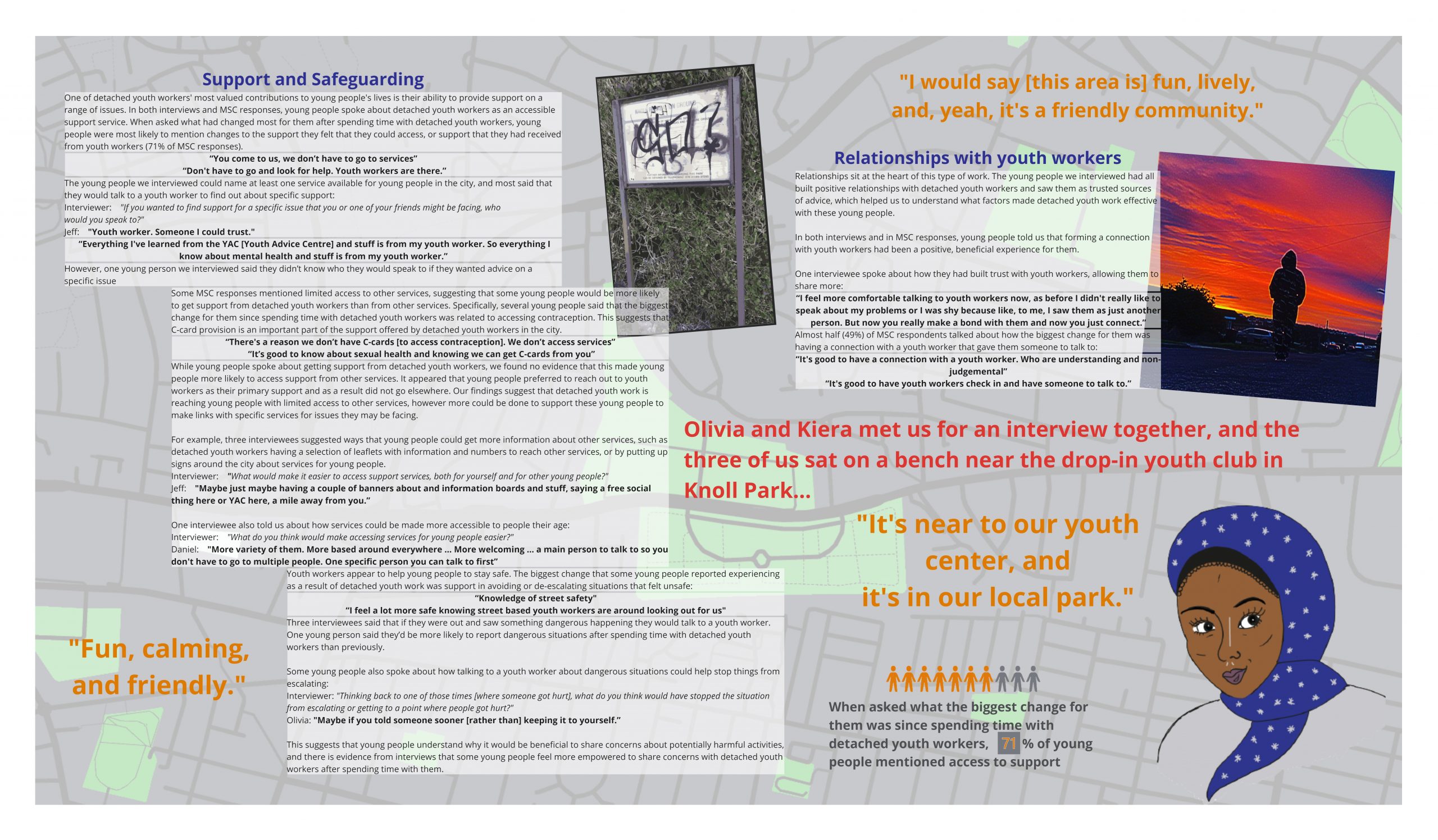
It’s near to our youth center, and it’s in our local park.
I would say [this area is] fun, lively, and, yeah, it’s a friendly community.
Fun, calming, and friendly.
When asked what the biggest change for them was since spending time with detached youth workers, 71% of young people mentioned access to support
Support and safeguarding
One of detached youth workers’ most valued contributions to young people’s lives is their ability to provide support on a range of issues. In both interviews and MSC responses, young people spoke about detached youth workers as an accessible support service. When asked what had changed most for them after spending time with detached youth workers, young people were most likely to mention changes to the support they felt that they could access, or support that they had received from youth workers (71% of MSC responses).
You come to us, we don’t have to go to services
Don’t have to go and look for help. Youth workers are there.
The young people we interviewed could name at least one service available for young people in the city, and most said that they would talk to a youth worker to find out about specific support:
Interviewer: If you wanted to find support for a specific issue that you or one of your friends might be facing, who would you speak to?
Jeff: Youth worker. Someone I could trust.
Everything I’ve learned from the YAC and stuff is from my youth worker. So everything I know about mental health and stuff is from my youth worker.
However, one young person we interviewed said they didn’t know who they would speak to if they wanted advice on a specific issue.
Some MSC responses mentioned limited access to other services, suggesting that some young people would be more likely to get support from detached youth workers than from other services. Specifically, several young people said that the biggest change for them since spending time with detached youth workers was related to accessing contraception. This suggests that C-card provision is an important part of the support offered by detached youth workers in the city.
There’s a reason we don’t have C-cards [to access contraception]. We don’t access services
It’s good to know about sexual health and knowing we can get C-cards from you
While young people spoke about getting support from detached youth workers, we found no evidence that this made young people more likely to access support from other services. It appeared that young people preferred to reach out to youth workers as their primary support and as a result did not go elsewhere. Our findings suggest that detached youth work is reaching young people with limited access to other services, however more could be done to support these young people to make links with specific services for issues they may be facing.
For example, three interviewees suggested ways that young people could get more information about other services, such as detached youth workers having a selection of leaflets with information and numbers to reach other services, or by putting up signs around the city about services for young people.
Interviewer: What would make it easier to access support services, both for yourself and for other young people?
Jeff: Maybe just maybe having a couple of banners about and information boards and stuff, saying a free social thing here or YAC here, a mile away from you.
One interviewee also told us about how services could be made more accessible to people their age:
Interviewer: What do you think would make accessing services for young people easier?
Daniel: More variety of them. More based around everywhere … More welcoming … a main person to talk to so you don’t have to go to multiple people. One specific person you can talk to first
Youth workers appear to help young people to stay safe. The biggest change that some young people reported experiencing as a result of detached youth work was support in avoiding or de-escalating situations that felt unsafe:
Knowledge of street safety
I feel a lot more safe knowing street based youth workers are around looking out for us
Three interviewees said that if they were out and saw something dangerous happening they would talk to a youth worker. One young person said they’d be more likely to report dangerous situations after spending time with detached youth workers than previously.
Some young people also spoke about how talking to a youth worker about dangerous situations could help stop things from escalating:
Interviewer: Thinking back to one of those times [where someone got hurt], what do you think would have stopped the situation from escalating or getting to a point where people got hurt?
Olivia: Maybe if you told someone sooner [rather than] keeping it to yourself.
This suggests that young people understand why it would be beneficial to share concerns about potentially harmful activities, and there is evidence from interviews that some young people feel more empowered to share concerns with detached youth workers after spending time with them.
Relationships with youth workers
Relationships sit at the heart of this type of work. The young people we interviewed had all built positive relationships with detached youth workers and saw them as trusted sources of advice, which helped us to understand what factors made detached youth work effective with these young people.
In both interviews and in MSC responses, young people told us that forming a connection with youth workers had been a positive, beneficial experience for them.
One interviewee spoke about how they had built trust with youth workers, allowing them to share more:
I feel more comfortable talking to youth workers now, as before I didn’t really like to speak about my problems or I was shy because like, to me, I saw them as just another person. But now you really make a bond with them and now you just connect.
Almost half (49%) of MSC respondents talked about how the biggest change for them was having a connection with a youth worker that gave them someone to talk to:
It’s good to have a connection with a youth worker. Who are understanding and non-judgemental
It’s good to have youth workers check in and have someone to talk to.
